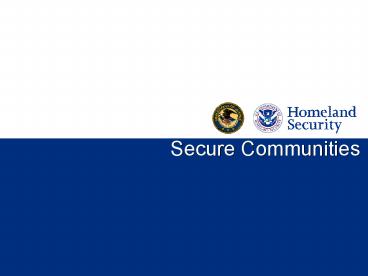Secure Communities - PowerPoint PPT Presentation
1 / 12
Title:
Secure Communities
Description:
by identifying and removing those criminal aliens ... Target criminal aliens who pose the greatest threat to local communities ... IAQ Immigration Alien Query. ... – PowerPoint PPT presentation
Number of Views:316
Avg rating:3.0/5.0
Title: Secure Communities
1
Secure Communities
2
What is Secure Communities?
- Our initial focus will be on identifying and
removing aliens who have been convicted of or
currently charged with a Level 1 crime - Our long term goal focuses on identifying and
removing all criminal aliens held in federal,
state and local jails and prisons
The goal of Secure Communities is to make our
communities safer by identifying and removing
those criminal aliens who pose the greatest
threat to local communities
Level 1 Crimes Include
- National security
- Homicide
- Kidnapping
- Sexual assault
- Robbery
- Aggravated assault
- Sex offense
- Cruelty towards child or wife
- Weapons
- Drugs (sentencegtI year)
3
How Will Secure Communities Benefit Law
Enforcement?
Target criminal aliens who pose the greatest
threat to local communities
- Makes your communities safer
Enable near real-time sharing of federal law
enforcement and immigration data Execution
- More accurate ICE response
- Minimal change to current procedures, local
training, and cost
Leverages existing technology and processes
- Immigration status determination made by ICE
Perform immigration status determination based on
biometric data
- ICE resources are at the ready
Leverages ICEs existing Criminal Alien Program
- Booking sites receive additional subject-related
information
Ensures no profiling all criminal submissions
are reviewed
4
How is a Subjects Immigration Status Checked Now?
The current process for checking a subjects
immigration status is manual and cumbersome
Detainer
DOJ CJIS IAFIS
USVISIT IDENT
NCIC
CIS
CLAIMS
NETLEADS
ICEPICS
Database
Database
Local officers manually notify the LESC to begin
the determination process of immigration status
of subject based on name only
LESC manually checks at least nine DHS and FBI
databases to identify the subject and determine
immigration status
LESC sends immigration status determination to
the local ICE office, who reviews the file and
creates a detainer manually
Operational Response
Manual Check
5
What is the Process for Secure Communities?
Secure Communities relies on the use of data
sharing technology to identify and determine the
status of criminal aliens and a rapid
operational response to detain high priority
criminal aliens
New One-Step Process!
DOJ CJIS IAFIS USVISIT IDENT Interoperability
Detainer
Local officers electronically submit prints of
all subjects booked to the FBI through their
states identification bureau
Prints will be checked automatically against FBI
CJIS IAFIS and USVISIT IDENT for potential matches
ICE will take enforcement action on removable
aliens being charged with or who have been
previously convicted of a level one offense
Operational Response
Technical Capability
6
What is the Technical Capability?
Interoperability between FBIs IAFIS and DHSs
IDENT system allows federal, state and local law
enforcement access to biometric-based
immigration information for the first time
- Criminal history and immigration identity
information will be accessible to and shared
among other Federal, State, and Local law
enforcement agencies, as well as authorized
non-criminal justice agencies - Interoperability eliminates the need for data
extracts - In addition to existing IAFIS processing,
Interoperability enables - Search of full IDENT repository (90 million
individuals) - Biometric-based access to IDENT repository for
the first time - Searches against two-print and 10-print records
in IDENT - Returns results via the IDENT Data Response (IDR)
7
US-VISIT Categories of IDENT Data
IDENT Watch List Known or Suspected
Terrorists DoD Military Operations Wanted
Persons Deported Felons International
Criminals Sexual Registrants
Lookouts Aliens/Criminal History Select
State/Local Criminals Gangs Expedited
Removals Visa Denials Recidivists/Alerts POE
Adverse Actions
Entry Asylum Refugee Immigration
Benefits Visa Applications Border Crossing Card
Applications Registered Traveler
Identity Information
Identity Information
8
IDENT Data Response
IDENT Data Response (IDR)
Response Times
- Provides basic immigration
- identity information but not immigration status
- Name
- DOB
- POB
- Gender
- System Record Number
- Photograph (if available)
- Includes up to 5 instances
- of each
- IDR returned to IAFIS within 15 minutes
- If positive IDR returned, IAFIS forwards an
Immigration Alien Query to the ICE Law
Enforcement Support - Combined IDR/Immigration Alien Response to
end-user within 4 hours
9
What is the Secure Communities Operational
Response?
ICE LESC Response
ICE Field Response
- Provide 24 x 7 Coverage
- Committed to taking enforcement action on all
identified Level 1 criminal aliens booked into
custody - Coordinate adequate bed space
- Coordinate adequate transportation
- Commence removal proceedings while in criminal
custody
- Perform immigration status determination
- Provide IAR response to LEA via DOJ IAFIS and ICE
Field Office within 4 hours
10
What is the Initial Deployment Phase?
MA
PA
VA
CA
NC
AZ
TX
FL
Key
Pilot Site
Interoperability Phase One State
New Site
11
- Questions/Comments?
12
Key Terms
- IAFIS FBIs Integrated Automated Fingerprint
Identification System. This is the FBIs
biometric data repository. - IAQ Immigration Alien Query. The IAQ is an
NLETS message requesting immigration information
on a given subject from the law enforcement
center. - IAR Immigration Alien Response. The LESC send
this message in response to the IAQ. - IDENT USVISITs Automated biometric ID system.
- IDR IDENT Data Response. This captures the
basic biographics for the five most recent
encounters that the individual has had with DHS. - LEA - Law Enforcement Agent/Agency.
- LESC Law Enforcement Support Center. ICEs
designated location for providing support to law
enforcement agencies. - ORI Originating Agency Identifier.































